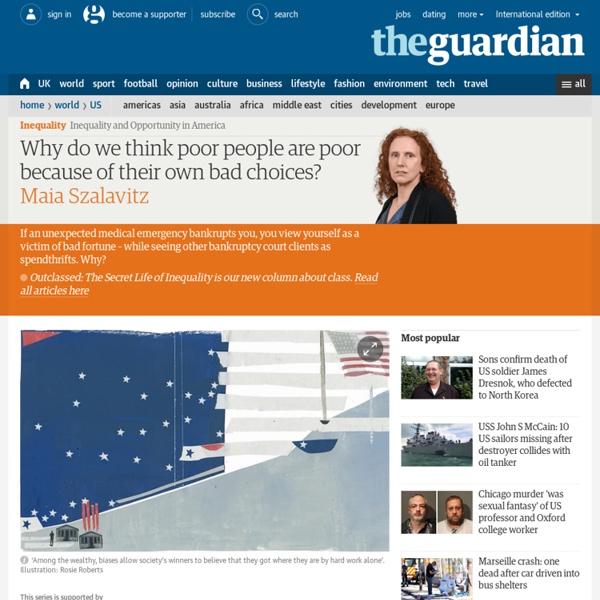We're climate researchers and our work was turned into fake news
Science is slow. It rests on painstaking research with accumulating evidence. This makes for an inherently uneasy relationship with the modern media age, especially once issues are politicised. The interaction between politics and media can be toxic for science, and climate change is a prominent example. Take the recent “deep freeze” along the US east coast. To scientists, it was one more piece of a larger jigsaw of climate change disrupting weather systems and circulation patterns.
The 2018 Midterms and the Specter of Voter Suppression
Read: The ‘hubris’ of the Supreme Court’s voting-rights ruling On Saturday, President Donald Trump ensured that the issue would be front and center as Election Day approached. “All levels of government and Law Enforcement are watching carefully for VOTER FRAUD, including during EARLY VOTING,” he tweeted.
Knowledge of different cultures shakes up psychology 2 clicks
The academic discipline of psychology was developed largely in North America and Europe. Some would argue it’s been remarkably successful in understanding what drives human behaviour and mental processes, which have long been thought to be universal. But in recent decades some researchers have started questioning this approach, arguing that many psychological phenomena are shaped by the culture we live in.
In poverty, groceries can be five times more expensive
A hidden camera in a San Francisco grocery store last year captured patrons' reactions when their items ring up as five times more expensive, adjusted to reflect the cost of living near the poverty line. In "Poverty Line Prices," above, people are shocked when they see their totals. When you're poor, milk can have an adjusted cost of $24. The video comes from Tipping Point Community, an organization that combats poverty in the Bay Area, and advertising agency Goodby Silverstein & Partners. In San Francisco, the average annual family income is $153,000, five times the $24,300 a year that families living on the poverty line earn (or roughly 1 in 10 families in San Francisco).
The tricks propagandists use to beat science
Back in the 1950s, health professionals became concerned that smoking was causing cancer. Then, in 1952, the popular magazine Reader’s Digest published “Cancer by the Carton,” an article about the increasing body of evidence that proved it. The article caused widespread shock and media coverage. Today the health dangers of smoking are clear and unambiguous.
More acidic oceans 'will affect all sea life'
Image copyright JAGO-TEAM/GEOMAR All sea life will be affected because carbon dioxide emissions from modern society are making the oceans more acidic, a major new report will say. The eight-year study from more than 250 scientists finds that infant sea creatures will be especially harmed. This means the number of baby cod growing to adulthood could fall to a quarter or even a 12th of today's numbers, the researchers suggest. The assessment comes from the BIOACID project, which is led from Germany. A brochure summarising the main outcomes will be presented to climate negotiators at their annual meeting, which this year is taking place in Bonn in November.
25 Captivating Pictures of Street Scenes Around the World
Amid the thrum and whirl of city life, today’s street photographers patiently wait for what their forebear, the influential French photographer Henri Cartier-Bresson, famously termed “the decisive moment:” that split-second when the visual and emotional elements of a scene come together to express its essence. Street photography is about the possibility—though never the promise—of capturing a flicker in time that might make a good photograph. That might mean glimpsing a symmetrical group of nuns in a Kolkata doorway and instinctively framing the image.
Don't Be Fooled: 'Generation Wealth' Is More About Wanting Than Having
Jackie and friends with Versace handbags at a private opening at the Versace store, Beverly Hills, California, 2007. Lauren Greenfield/INSTITUTE hide caption toggle caption Lauren Greenfield/INSTITUTE
"fake news" not new 2 clicks
Donald Trump may well be remembered as the president who cried “fake news.” It started after the inauguration, when he used it to discredit stories about the size of the crowd at his inauguration. He hasn’t let up since, labeling any criticism and negative coverage as “fake.” Just in time for awards season, he rolled out his “Fake News Awards” and, in true Trumpian fashion, it appears he is convinced that he invented the term. He didn’t.
Growing Up Surrounded by Books Has a Lasting Positive Effect on the Brain, Says a New Scientific Study
Image by George Redgrave, via Flickr Commons Somewhere in the annals of the internet--if this sprawling, near-sentient thing we call the internet actually has annals--there is a fine, fine quote by filmmaker John Waters: We need to make books cool again. If you go home with somebody and they don’t have books, don’t fuck them. Don’t let them explore you until they’ve explored the secret universes of books.



